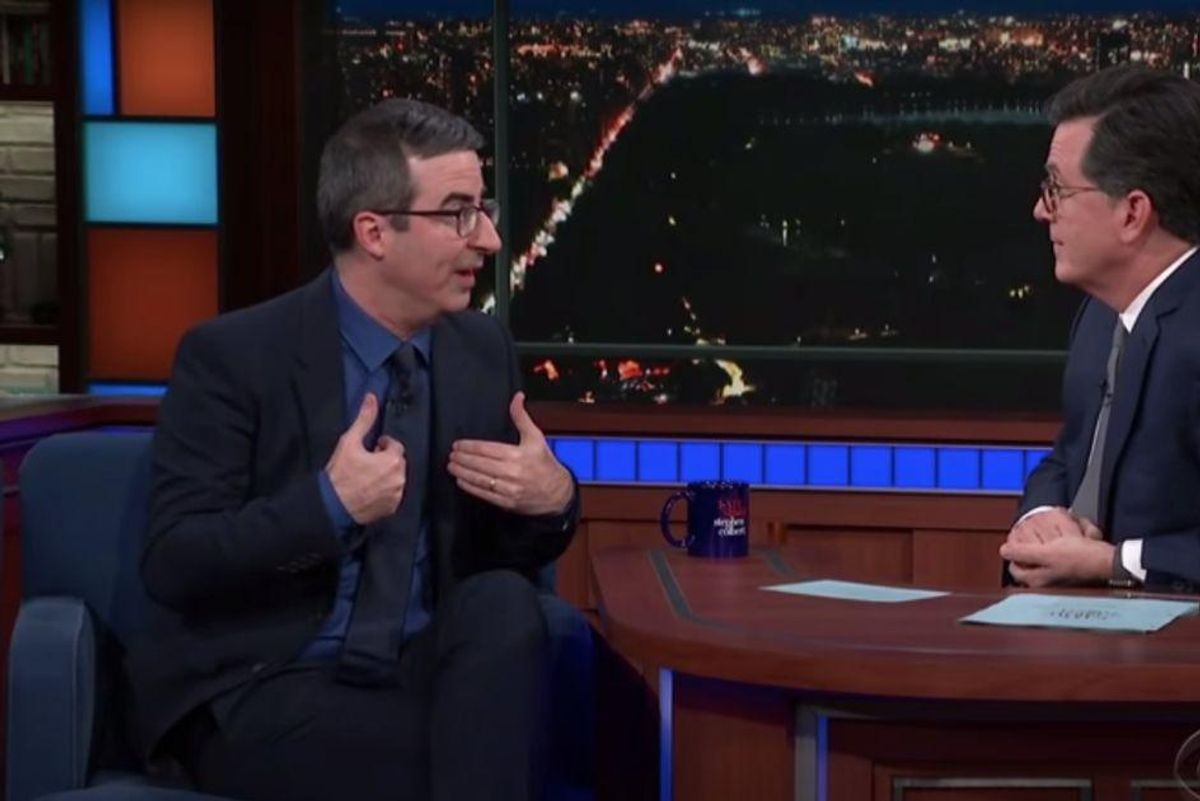John Oliver predicted Meghan Markle's future challenges with the Royal Family back in 2018
John Oliver is known for his biting political commentary and smart comedy, but some of his best takes have emerged in casual conversation.
In February of 2018, Oliver joined Stephen Colbert on The Late Show and discussed the pending nuptials of Prince Harry and Meghan Markle, who were married a few months later. When asked if he was excited about the wedding, Oliver gave a candid response that turned out to be remarkably prescient.
First, he said that he was not, in fact, excited about the wedding. Surprised, Colbert pointed out that Harry was marrying an American and Oliver had married an American, and asked if he had any advice for Harry. Instead, Oliver spoke of his sympathy for Meghan Markle.
"I would not blame her if she pulled out of this at the last minute," he said. "I don't think you need to have just seen the pilot episode of 'The Crown' to get a basic sense she might be marrying into a family that could cause her some emotional complications."
Colbert said, "But this generation seems like nice people, right? They're all nice now, right?"
"Yyyyyeah," Oliver responded. "I mean, they're an emotionally stunted group of fundamentally flawed people doing a silly pseudo-job. That's what she's marrying into. So I hope she likes it. It's going to be weird for her."
"I would not marry into the Royal Family," he added. "I'm a commoner, I would not be welcome—especially after what I've just said," he laughed.
Colbert and Oliver chatted joked about how Oliver's potential knighthood was now off the table, then Oliver shared his thoughts on the displays of reverence people show to the crown.
"It's just weird to kneel in front of another adult. It's odd. I know that historically you read and you see people kneeling down and kissing the ring, but it's a bit strange. It's an odd thing to still have."
Oliver's statements echo what many people feel about the monarchy—that it's an archaic institution that has outlived whatever relevance and usefulness it may have once had. Then again, the royal tradition is a powerful force in the U.K. and Queen Elizabeth is genuinely beloved—even by Harry and Meghan who are making headlines for sharing the issues they've had with the Royal Family as an institution (in addition to specific members they refused to name). Some love the pomp and the pagaentry and are willing to turn a blind eye to the problematic history that goes along with it.
It will be interesting to see what changes if and when Charles—who does not carry the "beloved" mantle of his mother—ascends to the throne. Will people lose some of the love and respect they have for the crown now? Will generations who have only known Queen Elizabeth as monarch view the entire institution differently in her absence? Naturally, the changing of a monarch has always been a transition, but society has changed a lot since 1953, when Elizabeth became queen. People may not be as forgiving of the faults of the Royal Family without its sweet, stalwart matriarch at the helm.
Since John Oliver nailed the Meghan Markle situation so accurately, perhaps his view of the monarchy will also be seen as a self-evident truth someday. Guess we'll see.
- Prince Harry is not happy about how the press has been treating his ... ›
- Princess Diana said strong women are seen as a threat. Meghan ... ›
- Meghan Markle and Prince Harry just delivered a very personal and ... ›
- A comic published in 1997 predicted online schooling in 2021 with eerie accuracy - Upworthy ›

